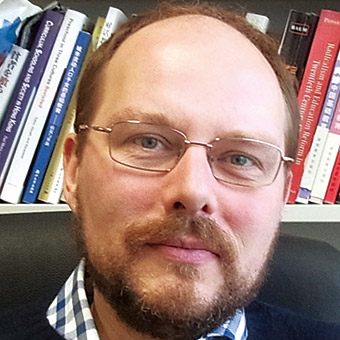九州大学 大学院人間環境学府
大学院人間環境学府
大学院人間環境学研究院

Edward Vickers教授Edward Vickers
| 専攻 | 教育システム専攻 |
|---|---|
| 部門 | 教育学 |
| コース |
修士:
現代教育実践システム 総合人間形成システム 博士: 教育学 |
| 講座 | 国際教育環境学講座 |
| 九州大学研究者 データベース |
https://hyoka.ofc.kyushu-u.ac.jp/search/details/K004574/index.html |
研究テーマ
研究内容
How I became an educational researcher:
In the mid-1990s, I was a high school teacher in Hong Kong, just before the territory was returned by Britain to China. I taught history to the senior students at my school, and was amazed that the curriculum included no Hong Kong history. Hong Kong students studied the history of China and of the modern West, but they didn’t study the history of Hong Kong itself. So I decided to research the history of Hong Kong’s school curriculum, in order to find out why this strange situation had come about. This was the beginning of my interest in the relationship between history, education and identity consciousness in China and East Asia.
After completing a PhD at the University of Hong Kong, in 2000 I moved to Beijing to work for the People’s Education Press (where I helped to write English language textbooks for Chinese secondary schools). I lived in Beijing for three years, and my experience of working there for the government’s main school textbook publisher stimulated my interest in China’s education system.
Meanwhile, my travels throughout China have made me aware of the rapid growth of the heritage and tourism sectors there – and, in particular, the role of museums in ‘patriotic education’. This has become another of my research interests.
The sources and methods I use in my research:
For my early research on curriculum history in Hong Kong, I used a range of sources – official documents, interviews and school textbooks. I was lucky to be given access to all the records of the official curriculum development committees for a period from the late 1970s onwards, and these became my most important source. I also interviewed a number of the people who had been involved in curriculum development, and these interviews were very useful in helping me to better understand what I was reading in the documents.
School textbooks cannot reflect everything that happens in the classroom, and may be used in different ways by different teachers (or students). However, textbooks tend to play a particularly important role in East Asian schools – in delivering the curriculum and serving as handbooks for exam preparation. In countries like China, textbook publication is also quite closely controlled or supervised by the government. In my research on history education and moral/political education in China, I have therefore used textbooks to analyze what students are expected to learn about their own government and society, and about their identity as ‘Chinese’.
In my research on museums, I collect data on museum displays themselves (using digital photographs where possible), and analyze exhibition catalogues for evidence relating to past exhibitions. I also interview museum curators to find out more about the aims behind their displays.
Difficulties I have experienced in doing research:
Debates over national history are often very politically sensitive, especially in a society like China where the government insists on certain ‘correct’ interpretations of the past. I have sometimes found it difficult to gather data or conduct interviews relating to the representation of history in museums or school curricula in China. However, my main difficulty as a researcher has been finding the time to analyze properly the data I have collected, and write books or articles based on it.
My own experience of postgraduate student life:
I was lucky as a postgraduate student to obtain a scholarship to support me during my PhD studies at the University of Hong Kong. I therefore did not have to work to support myself when I was doing my doctoral research, and could focus fully on my studies. However, the most important thing for me – as for all research students – was the support of my supervisor. I was fortunate to have an excellent supervisor when I was working on my doctorate – Professor Paul Morris. He was not an expert in my particular field, but he was interested in my research, always made time to meet me and discuss my work, and asked me questions that helped me to focus my analysis and clarify my argument.
Message to postgraduate students:
Studying for a postgraduate degree requires a lot of determination and commitment. You need to spend a lot of time by yourself reading, thinking and writing, and often (especially at PhD level) you will spend several years researching one particular topic. Before you start a postgraduate degree, you should have a clear idea of why you want to do it. Is there a particular topic or issue that you want to spend several years researching? Does the life of a researcher and academic appeal to you and, if so, why?
Attitude towards interdisciplinary collaboration:
The boundaries between academic disciplines are largely artificial. What is important is the question or issue you want to research, and the relevance of the methods you use to research it. I have collaborated with anthropologists, sociologists, historians and political scientists – outside as well as within the field of ‘Education’. I always encourage my students to do the same.
Future research plans:
I am currently working on a project looking at how Japan is portrayed (in school curricula, museums, the media, etc.) in other East Asian countries, and at perceptions of Japan amongst young people in East Asia. I plan to continue working on this over the next few years, but also to conduct similar research into portrayals and perceptions of China in neighbouring Asian countries.
Recommended literature:
– Eugen Weber (1976). Peasants into Frenchmen
– Stig Thogersen (2002). A County of Culture: twentieth-century China seen from the village schools of Zouping, Shandong.
– Carol Gluck (1985). Japan’s Modern Myths: Ideology in the late Meiji Period.
– Joseph Tobin et al (2009). Preschool in Three Cultures Revisited.
研究ブログ
研究ブログが投稿されていません。